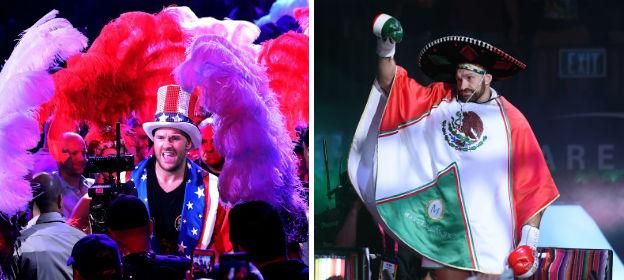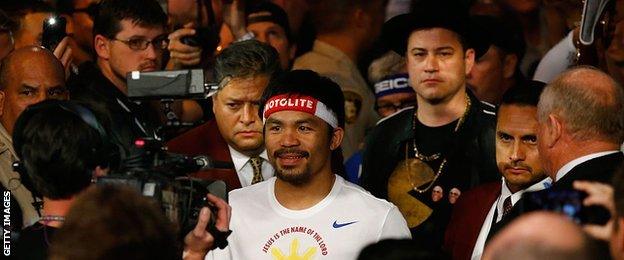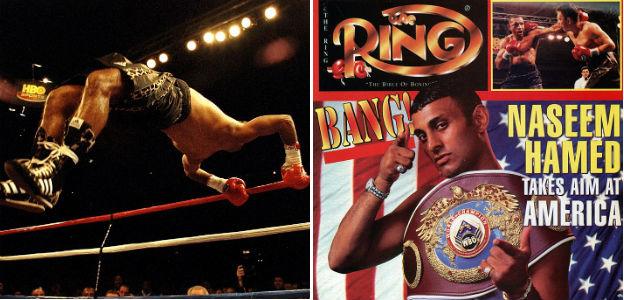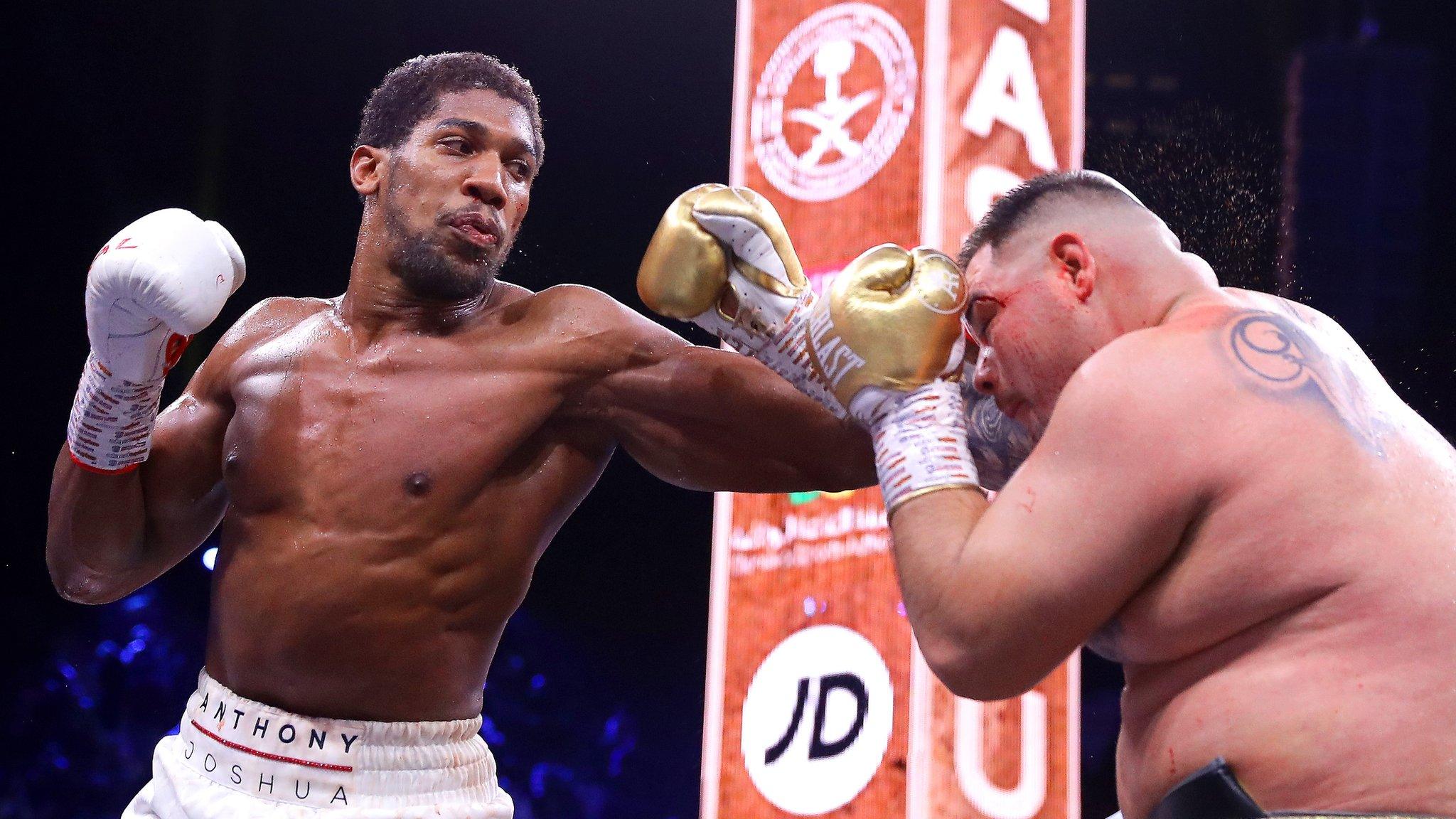Tyson Fury: How Manchester fighter has built his following - and plans to break America
- Published
- comments


Fury made his WWE debut at October's 'Crown Jewel' pay-per-view event in Riyadh, Saudi Arabia
Under the tree, his best-selling book. On the radio, a festive duet with Robbie Williams. On TV, adverts for his forthcoming reality series.
As jolly, bearded faces of Christmas go, Santa had a rival this year. Tyson Fury was, and is, everywhere.
He may lack the showreel of brutal knockouts boasted by famous namesake Mike. He might not be a clean-cut, on-message corporate dream, like heavyweight rival Anthony Joshua. And he is not a Ricky-Hatton style figurehead who commands a whole city of loyal fans, either.
Fury, 31, has made his own success story. The self-styled 'Gypsy King' from the Traveller community has defied logic, won over the public and come up smiling as boxing's clown prince, now preparing for another big fight in the US - a rematch with Deontay Wilder on 22 February.
So how has he done it? And what can Las Vegas expect next?

"To be a boxer, just some random boxer who's talented, ain't enough," Fury told BBC Radio 5 Live in November.
"It's enough to win a fight but it's not enough to sell tickets, it's not enough to do pay-per-view, it's not enough to be noticed and for people to talk about you outside of boxing."
Fury's first piece of crossover content, in March 2009, was entirely accidental.
In his fourth professional fight, he beat 32-year-old journeyman Lee Swaby at the now-defunct Aston Arena.
Backing his opponent against the ropes in the fourth round, Fury threw an uppercut. Swaby, from behind his peek-a-boo guard, ducked in anticipation. The punch glanced off Swaby's forehead and deflected, at full momentum, into Fury's face.
Tyson Fury - I had to let go of my "outlaw" character
Two million plus views on YouTube followed. Long after the headline result was forgotten, a moment of high farce in a low-profile fight lived on.
In the 11 years since, Fury, whose ringcraft, reach and defensive skills now make for bigger victories, has been a relentless and innovative seller of himself.
A stand-up stint for Sport Relief in 2012, taping over his mouth in protest at a British Boxing Board of Control fine in 2014, a news conference dressed as Batman in 2015, another with an entourage of five cheerleaders in 2016, buying 1,000-euro rounds of drinks for fans, ring walks inspired by Apollo Creed and Mexican Independence Day, impromptu karaoke, dressing-room visits from his celebrity mates, UFC, WWE and a home-made social-media output that apparently comes direct from the big man's fingertips, unfiltered by PR safety nets.
"Boxing is different to many sports," says sports marketing expert Nigel Currie.
"If you are a Premier League footballer, you are on the big stage every Saturday or Sunday to maintain your profile. As a top-level boxer you could go a year, 18 months without a major fight.
"It's a complicated, calendar-less sport and it's tricky to maintain a regularly high profile. In the old days you would have to call a press conference to announce your plans and sell yourself to the press. Fury has a pretty modern and pretty intelligent approach - with social media these small details and antics can be picked up and spread far beyond a traditional boxing audience."
How on earth did Tyson Fury end up singing a duet with Robbie Williams?
Fury always had the imagination to pull a stunt and subvert boxing's po-faced beef-heavy norms. Where other fighters generate more threats and menace than a mob movie, Fury veers dramatically off-script.
His claim earlier this month to be preparing for the Wilder rematch, by masturbating seven times a day was typically outlandish and entirely in character. , external
But a man who won the heavyweight title in the ring, lost it in a haze of drink, drugs and wasted days and is part of an intriguing three-way wrestle for control of the division, is now subject to a new focus.
Early in his career he would rant, rave and froth to get his five minutes of fame. Today, the media come to him asking for hour-long sit-down interviews, complete with photoshoot.
Frank Warren, his UK promoter, tells BBC Sport: "I think there was a lot of paranoia in the camp before. It was hammered into Tyson: 'You are a Traveller, you are an outsider.'
"But this is a guy who can talk as well as fight. And we all see he is engaging, very intelligent and articulate. It was just a case of getting him into platforms to show that."
In the opening five minutes of an hour-long podcast hosted by Mike Tyson in September,, external he touched on the history of the Gypsy people, their portrayal in the media and the pioneering 1850s heavyweight Jem Mace.
He willingly turns that same gaze inward. He often reflects at length and in depth about the depression, addiction, infidelity and weight gain that kept him out of the ring for two and a half years after his shock triumph over Wladimir Klitschko in Germany in 2015, explaining frailties while rivals bluster and boast.
As he prepares for his Las Vegas rematch with Wilder, that mix of introspection, eloquence and wit is about to be tested stateside.
"I just tell him: 'Be you.' They are going to eat it up," says Bob Arum, the legendary American promoter who is overseeing his career in the United States.

Fury's ringwalks have been nods to attracting a new audience
"The American public have found him humorous, outrageous - they wrapped themselves in his personality, his dress going into the ring, his singing, he has sold himself to the public in the US.
"Prince Naseem Hamed, Amir Khan and Ricky Hatton brought their UK fanbases with them, but they never became great American attractions.
"Tyson - you let him loose and he is attracting a tremendous number of Americans. We are going to have a big push to have him on our late-night shows - Stephen Colbert, Jimmy Kimmel, Jimmy Fallon. They get a huge audience and helped build Manny Pacquiao's personality because he did such a good job on late-night television.
"And there is absolutely the appetite to have him on.
"The big danger in television is when you are conducting an interview and the person being interviewed is so boring that people can use their remote and go to another station.

Talk show host Jimmy Kimmel, in black with hat, was part of Manny Pacquiao's entourage for his fight against Floyd Mayweather after Pacquiao appeared on his show
"When I was younger, in the 1950s and 1960s, people didn't have as many choices. Nowadays, not only on linear television but also on the internet, you can keep yourself busy and occupied every second for 24 hours.
"But when you have a guy like Tyson, who is coming up with one thing after another, you are intrigued and tend to watch the whole broadcast. They need a guy like Tyson Fury who can not only attract an audience, but can keep an audience."
Not everyone has always been transfixed with interest and admiration.
Fury has in the past free-wheeled straight into homophobia, sexism and anti-Semitism, his Old Testament brand of Christianity tinged with modern conspiracy theories.
In recent interviews, he has said those outbursts were related to his mental illness, or misguided attempts to generate publicity.
"I was the outlaw, the bad boy, the man who didn't give a damn," he told BBC Radio 5 Live last year.
Boxer Fury's bizarre Batman entrance
"I was the man who would say stuff and cause reactions and divide opinions and people would print stuff about me, but it was all part of you know, this character I was playing.
"There comes a point where I couldn't do it any more, I just had to be me. I had to let go of the character, because I got lost in it. I couldn't be me anymore."
In an era in which politicians can successfully shrug off illiberal comments from their past, and in a sport in which legends are elevated regardless, any lasting harm to Fury's reputation seems minimal.
"The most famous sportsman in my lifetime was Muhammad Ali," says Warren.
"When he was Cassius Clay, he called the white man the Devil, he said blacks shouldn't marry whites, that budgies don't go with parrots - quite strong and racist comments.
"But that was what he said at that age, it was quite stupid, quite ridiculous, and as time went on he became a well-loved humanitarian and the most loved sportsman of my time."
In any case, maybe there is not a lot that Warren, or anyone else can do about it.
Team Fury is as changeable and unwieldy as the Fairport Convention line-up,, external with only the man himself fixed as a permanent point.
He split acrimoniously from his uncle and former trainer Peter Fury in the wake of his win over Klitschko. His relationship with former promoter Mick Hennessy went similarly south. Ben Davison, the man who oversaw his comeback to the ring, has been sidelined in favour of American Javan 'Sugar' Hill for his preparations for the Wilder rematch.
Warren and Arum are the latest to look after the promotional side. Robert Davis, Fury's long-time lawyer, has an eye on the finances, and the fighter has also engaged a management company and PR firm.
But none has a full view of his intentions. Nobody is dictating a masterplan.
"A couple of things we get involved in, but I would say 98% of the stuff comes from him," says Warren, who only learned of Fury's foray into WWE after it happened.
Let's fight! Tyson Fury sparks 'mass brawl' at WWE event
Arum tells a similar story: "He has ideas about things to do, except Tyson being Tyson he does them first and then asks me what I thought!"
So firm is Fury's grip on his own career that Joshua's camp reportedly made an approach to set up a fight in early 2019 direct to the man himself, with Fury then convening his brains trust to discuss and dismiss the offer.
Between them, Warren and Arum have more than 90 years' experience in the boxing business. What do they compare the Fury phenomenon to?
"From a fun point of view it is like working with Naz [Hamed] in the early days, Naz was great fun, he wasn't to everyone's taste, but it was great fun promoting him," says Warren.
"It is like that with Tyson. You never know what to expect, but you know it is never going to be dull. There is always going to be a spark there.
"He is a man of the people, he has not got a load of agents or entourages that does not let you get near him, he will go down the street and sign autographs, walk into the bar and buy everyone a drink. That is the type of guy that he is."
"For me he is like a combination of Ali and George Foreman," says Arum.

Hamed, also promoted by Warren, fought five times in the United States, suffering the only defeat of his 37-fight career against Marco Antonio Barrera in Las Vegas in April 2001
"Ali was the genius of the sound bite, but in those short phrases there was a lot of profundity. Tyson does not speak particularly in sound bites, but he articulates thoughts and they stay with you.
"The second incarnation of George Foreman had an incredible way to make fun of himself, to have people laugh not at him, but along with him. He would pose with hamburgers, because people said he was too fat, turning it in his favour by making people laugh with him.
"Tyson has that ability. He has the ability to look at himself and what people are saying about him and laugh along with the public. That defuses a lot of things and makes a lot of friends."
By the time he steps into the ring against Wilder, Fury will have doubtless made a few more.
- Published7 December 2019
